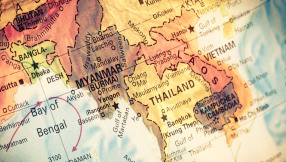Germany Fears Its Peacekeepers Being Targeted in Afghanistan
A senior Taliban leader told the German weekly Der Spiegel in March that German peacekeepers deployed in the relatively quiet north of Afghanistan would no longer be spared the deadly attacks which were then commonplace in the southern regions.
German police, soldiers and aid workers have been killed and civilians kidnapped, intensifying debate in Germany on whether it is time for Germany to call it quits in Afghanistan where a resurgent Taliban is making strong gains.
German government officials have expressed concern that the Taliban may have targeted Germany to influence debate on the renewal of Berlin's peacekeeping mandate this fall.
"Those behind the attacks and kidnappings want to sabotage our long-term engagement," German Development Minister Heidemarie Wieczorek-Zeul told weekly newspaper Die Zeit. "That's why we can't give in to them."
NATO has some 40,000 troops in Afghanistan, which it sent there after a U.S.-led invasion toppled the Taliban government following the attacks on the United States on Sept. 11, 2001.
Germany's own mandate permits the deployment of up to 3,500 troops in northern Afghanistan.
Christopher Langton, head of defence analysis at the International Institute for Strategic Studies in London, said it was possible Germans and others were being targeted in efforts to weaken their resolve to stay in Afghanistan.
"There is certainly a possibility of certain nationalities being targeted because they have troops in the country," said Langton, adding that the insurgents were simultaneously trying to pressure and undermine the Afghan government.
Other analysts say it is too early to be sure to what extent recent kidnappings of German and South Korean aid workers -- several of whom were killed by the Taliban kidnappers -- are y aimed directly at these two countries.
DISTRUBING TREND
Joanna Nathan, an analyst in Kabul for the Brussels-based International Crisis Group think-tank, said the kidnapping of foreigners was a new and disturbing trend but most kidnappings were opportunistic and in areas where people rarely travel.
She said an attack like the one last week which killed three German policemen could have been aimed directly at Germany, but added: "I'm not sure that they're specifically targeting countries and peacekeeping nations yet."
A Kabul-based Western security expert who declined to be named said Germans were merely "targets of opportunity".
There may be a precedent for specific attacks on nationals of a particular country, Langton said. He said the number of attacks on the Dutch appeared to rise before a parliamentary election in the Netherlands and a vote in parliament on the Netherlands' peacekeeping presence in Afghanistan. The Dutch voted in an election last year.
"Of course we have no way of knowing whether this is deliberate or coincidental," he said.
Hajo Funke, a professor of political science at the Free University in Berlin, said events in Afghanistan had already affected discussions in Germany on its Afghan mandate.
Conservatives such as Chancellor Angela Merkel, who oppose withdrawal from Afghanistan or dilution of the country's peacekeeping mandate, seem even more determined to stay.
"They have deepened the divide between those who want to keep the mandate and those in the (left-wing) opposition who want to change or eliminate it," Funke said, adding that most Germans would like their troops brought home.
DECISION ON MANDATE
Although Germany is expected to renew its troops' mandate, there is a possibility parliament will narrow it.
The mandate is already limited, preventing Berlin deploying peacekeepers in the troubled south or west of the country despite pressure from NATO allies to send troops there.
Some members of Germany's coalition would like Berlin to have more freedom, above all to train Afghan security forces in the south. Senior Foreign Ministry officials say this is a possibility, but it is not clear whether parliament will agree.
Kidnapping of foreigners is a recent phenomenon, but Langton said abduction for cash had a long history in Afghanistan.
"Kidnapping for profit is a pattern of life, an activity that has been part of Afghanistan going back centuries," he said.
Last weekend a criminal gang -- not the Taliban -- kidnapped a German aid worker and held her for two days before she was rescued by the police. Analysts said they wanted a ransom.
If the goal is money, kidnapping Germans can be very lucrative. It is an open secret that Berlin pays ransoms.











